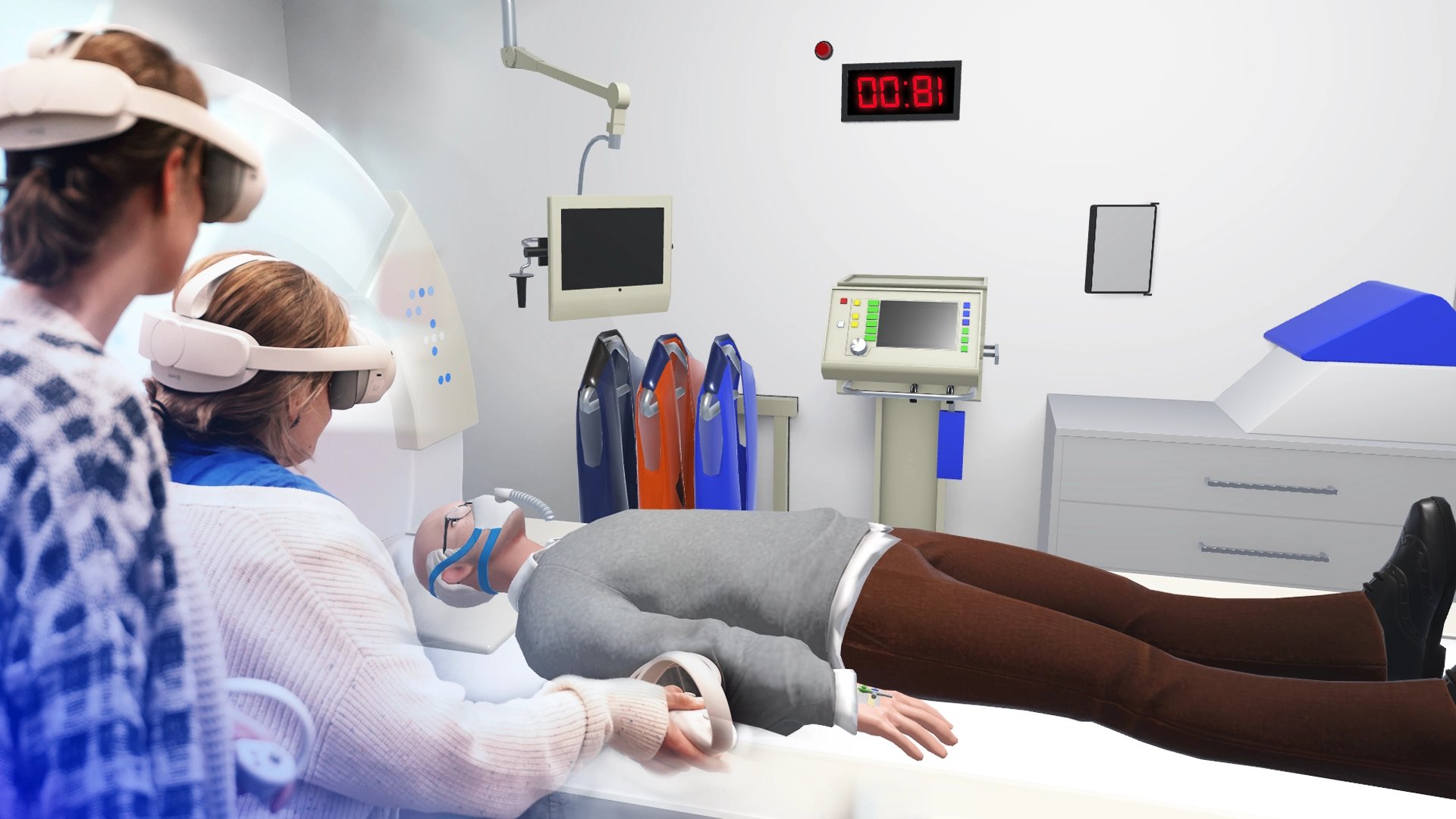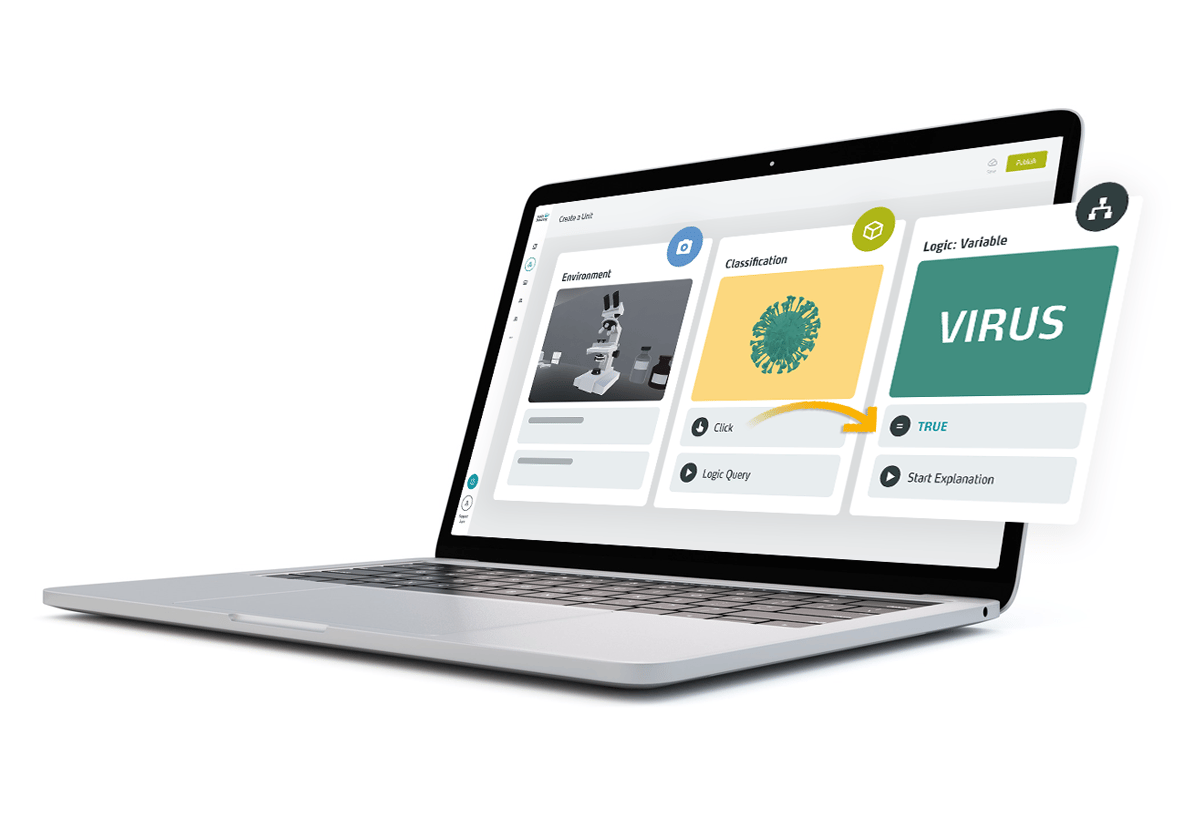Making Digital Employee Onboarding From Abroad Work – BARMER Hub
How the BARMER Hub uses Virtual Reality for the onboarding of international employees from abroad for smooth integration.
AI and VR are driving innovation in drug research through to commercialisation and ensuring better treatment outcomes.
01. How can Virtual Reality Support the Pharmaceutical Industry?
02. Digitalization Benefits for the Pharmaceutical Industry
03. How to Overcome the Biggest Challenges
04. Ways AI can be Utilized in the Pharmaceutical Industry
05. Pfizer and Hands-on VR Training
Drug research and patient care advances are constantly changing the way we approach the healthcare and pharmaceutical industry. However, with the rise of Artificial Intelligence (AI), the industry is facing a revolutionary change.
From analyzing vast amounts of data to developing more effective treatments: AI has the potential to transform every stage of the drug development process, making it faster, more efficient, and more patient-centred than ever before. In this article, we explore how AI and VR are transforming the pharmaceutical industry from drug development to patient care, and examine the opportunities and challenges that lie ahead.
Virtual Reality pharmaceuticals refers to the use of virtual laboratories in drug development, patient care, and medical training. This technology is used for immersive simulations:
VR can be used to simulate molecular interactions between drugs and target structures. This provides information about the efficacy and safety of drugs. With the help of VR simulations, researchers can test drug candidates in a virtual environment, reducing the need for animal testing and clinical trials on humans.
By developing immersive learning content for patients, e.g. in VR therapy for anxiety and phobias, patients are provided with interactive learning content that helps to improve treatment success and adherence.
Medical training offers practical experience and realistic simulations for complex or difficult-to-access procedures. In addition, medical professionals can gain experience in dealing with difficult medical situations, such as mass casualties, without putting patients at risk.
Virtual environments that simulate real-life scenarios can help researchers assess the effectiveness of new treatments and medical devices.
ManufacturingIn manufacturing, VR simulations are used to optimize production, reduce downtime, and improve efficiency. They help to identify and resolve potential production problems before they occur.
Virtual Reality can be used for virtual plant tours of production facilities to give participants a realistic and interactive experience of the production process.
It also enables the development and testing of medical devices, allowing designers and engineers to view the devices in a virtual environment before production.

By using digital tools and strategies, the pharmaceutical industry can optimize drug development, clinical trials and patient care, ultimately improving the healthcare system as a whole. The digital sector is particularly important in the pharmaceutical industry as it offers a wide range of benefits:
Digital technology can optimize processes and automate repetitive tasks, reducing the time and cost of drug development, clinical trials and manufacturing.
Easier communication and collaboration between researchers, physicians and other players in the pharmaceutical industry improves decision-making and accelerates drug development.
By analyzing patient data, identifying potential safety issues, and improving treatment adherence, treatment plans can be personalized and treatment outcomes improved.
Remote consultations, telemedicine and other digital health services are making healthcare more accessible to patients who may have difficulty accessing traditional healthcare services.
Digital technologies can foster innovation and enable new approaches in drug development, clinical trials and patient care. For example, digital tools such as artificial intelligence, virtual reality and wearable devices can provide new insights into disease mechanisms and improve patient outcomes.
One key advantage of virtual lab training with VR is that it can be tailored to the needs of individual learners. Learners can determine the level of difficulty, pace, and area of focus, allowing them to learn at their own pace and according to their own learning style. This allows learners to gain a deeper understanding of laboratory procedures and techniques and to better memorize the information.
It allows for more accurate and comprehensive data analysis so that researchers and physicians can gain insights into disease mechanisms, identify potential safety issues and optimise treatment regimens.
Despite the significant potential benefits of Virtual Reality for the pharmaceutical industry, various challenges need to be overcome to ensure effective and ethical use of the technology.
Developing high-quality VR simulations can be costly, especially for smaller pharmaceutical companies with limited resources.
Working with external partners, such as 3spin Learning, to share the cost of developing VR simulations is one solution. This can reduce the financial burden on the pharmaceutical company while at the same time utilizing the benefits of VR technology. Another solution is to prioritize VR in areas where it can have the greatest impact, such as drug discovery and medical education.
For some users, VR technology can be intimidating, especially for older patients and healthcare professionals who are unfamiliar with the technology.
Design user-friendly and intuitive VR experiences that make it easy for users to navigate and interact with the virtual environment.
Pharma AI, also known as Artificial Intelligence in Pharmaceuticals, refers to the use of AI and machine learning techniques to transform various aspects of the pharmaceutical industry, including drug development and manufacturing, clinical trials and patient care in healthcare.
Several examples show how the use of AI and machine learning is transforming the pharmaceutical industry:
AI can be used to optimize production processes, reduce downtime and improve quality control. For example, Bayer has optimized the production of its blood thinner Xarelto with the help of artificial intelligence and reduced the manufacturing time from 11 to just 4 days.
AI can be used to analyze large amounts of data, including genetic information, protein structures, and chemical properties, to identify promising drug candidates and predict their efficacy and safety. Insilico Medicine, for example, has used AI to identify potential drug candidates for a number of diseases, including cancer and Alzheimer's disease.
AI can be used to optimize regulatory processes and reduce the time and cost of drug approvals. For example, HealthVerity has developed an AI platform that can automate the collection and analysis of real-world data for marketing authorization applications.
As one of the world's largest pharmaceutical companies, Pfizer uses Artificial Intelligence and VR to qualify its medical staff in a safe space for effective training of stroke patients.
As part of the VR training, staff gather in a virtual hospital and complete a role play as a team that can take place anywhere and at any time. In this way, Pfizer is improving patient care and helping to save lives.
As soon as they see the patient and hear the alarm, participants forget everything around them. This is an absolutely unprecedented opportunity to revolutionzse medical training.

Augmented Reality allows digital information to be superimposed on the real world, creating an environment that connects the virtual and real worlds. Various AR applications are used in the pharmaceutical industry, including
AR can be used to create immersive medical education experiences that allow students to visualize and interact with anatomical structures and medical procedures in a virtual environment. In addition, augmented reality can provide real-time guidance and feedback and help students improve their skills and understanding of medical concepts.
AR can be used to visualize molecular interactions between drugs and target structures. This provides insights into the efficacy and safety of drugs. By using AR simulations, researchers can test drug candidates in a virtual environment, reducing the need for animal testing and human clinical trials.
Real-time guidance and feedback for operators, improving efficiency and reducing errors. By using AR glasses, operators can view instructions, schematics, and other relevant information without having to take their eyes off the task at hand.
The pharmaceutical industry is undergoing a fundamental transformation and VR, artificial intelligence and other advanced technologies will improve drug development and patient care in every way.
From faster drug development and clinical trials to better medical education and patient care, the applications of AI and VR in the pharmaceutical industry are limitless.
We specialize in using Virtual Reality, Augmented Reality, and 360-degree training to create interactive and engaging learning experiences in medical education.

How the BARMER Hub uses Virtual Reality for the onboarding of international employees from abroad for smooth integration.
In an interview with BARMER, discover the groundbreaking possibilities of Virtual Reality in medical education for health care.
Discover how interactive training transforms your employee training by providing an engaging experience that improves engagement, retention and...
Stay up to date on new insights in VR / AR learning with AI and build or improve your knowledge within the technology.